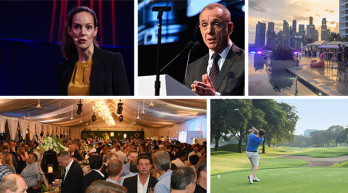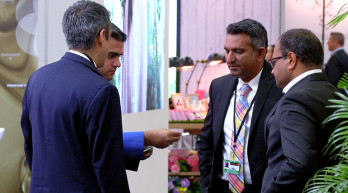

A thought-provoking keynote address from The Economist’s Foreign Editor Robert Guest looked at how the geopolitical climate is affecting trading relationships between the world’s superpowers. He spoke of how societies can be ‘open’ or ‘closed’. Travel, he said, can only be good for the world as it broadens the mind. When you let people in, he concluded, you get the benefit of their ideas and culture - and that makes the world more prosperous.
Next on stage, Kate Ancketill, CEO of GDR Creative Intelligence offered fascinating insight into how ‘new retail’ (combining online, offline logistics and data across a single value chain) will define the retail landscape of the future. Multi-tracking, which sees the same retail space adapted and regularly updated to suit a wide range of consumers, is one of the most important movements that is shaping today’s retail.
3Sixty’s Executive Vice President Roberto Graziani spoke of the retail revolution that started with e-commerce and accelerated with the development of smartphone technology. With 25% of all e-commerce sales in the US already being carried out on a mobile, online channels will soon overtake offline. Effective partnerships to leverage data, strong use of data analytics and innovation are essential for omnichannel to truly elevate travel retail.
Offering an airline’s perspective, Campbell Wilson, SVP of Sales and Marketing at Singapore Airlines said that the airline is usually the anchor in any data consortium. He said that sales can no longer only take place on board, and airlines must go online to give travellers what they want, when they want it.
Przemyslaw Lesniak, CEO of Lagardère Travel Retail Pacific stated that in the current travel retail market, being a superb retailer is no longer enough. He outlined how he had adopted the welcoming and fun characteristics of the local culture within his own business. More than a brand or retailer, we should actually strive to be ‘an unforgettable host’, he said.
Dong-ik Shin, Director of Concession Planning Team at Incheon International Airport explored the role of retail in the airport of the future. He described a virtuous cycle, in which revenue from travel retail is used to improve facilities and maintain lower charges. This helps airlines to become more competitive and bring in more passengers, which in turn increases retail revenues. Already enjoying duty free revenues which are growing much faster than passenger traffic, his airport’s vision is, he said, to become the world’s best for shopping and dining by 2025.
Duty Free World Council’s President Frank O’Connell took to the stage to announce the launch of an industry-wide training platform, created in partnership with the Institute of International Retail. While face-to-face training can be costly and takes staff off the sales floor, the new programme is a cost-effective way to deliver an internationally recognised educational programme. It will provide clear career pathways which will help to improve staff retention, and build a community of loyal staff which will positively impact returns.
Moving on to the highly pertinent subject of sustainability, Vanessa Wright, Group Vice President of Pernod Ricard stated that increasingly consumers want to work for and buy from companies that ‘do the right thing’. There are a number of simple measures that the travel retail industry can take, such as offsetting, but sustainability should be the responsibility of all in an organisation, not simply that of one department. Her own company’s action plan detailed a commitment to strive for sustainability ‘from grain to glass’.
Gemma Bateson, JTI Worldwide Duty Free Corporate Affairs Director examined the challenges arising from the legislative constraints encroaching on brands’ capacity to market themselves effectively. While regulation is not per se a ‘bad thing’, that regulation, which is often designed for the different circumstances of the domestic market, must be proportionate and sensible. The demand for regulation relating to product labelling will affect all categories, and she called for a united approach in combatting the threat.
Nestlé International Travel Retail’s General Manager Stewart Dryburgh said that there was plenty of room for growth in his category, and confectionery & fine food could be worth US $10 billion in 10 years’ time. Key to this growth is meeting consumers’ three core needs, which are Deeper Connections (meaning how connected consumers are to friends and family); Better for You (the ability to choose healthier products); and Elevated Experiences (which means enjoying a bigger and better experience).
The day concluded with a look into the future of technology from Alan Brennan, Managing Director at creative commercial tech agency dcGTR. He said success within the duty free and travel retail industry will be affected by our ability to research and establish what our customers want. Virtual reality technology can enable us to understand how customers would behave in a store, and what choices they would make, without the need to invest in a physical building.



